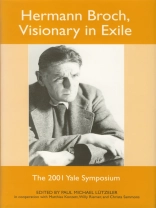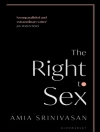Studies of one of the foremost 20c Austrian writers, as a critic and as a novelist and dramatist.
The Austrian novelist Hermann Broch ranks with Kafka and Musil among the three greatest 20th-century Austrian novelists and belongs to the century’s most gifted novelists in German from whatever country. He established his reputation with
The Sleepwalkers, a trilogy of political and philosophical novels. His best-known work is
The Death of Virgil, a long, challenging work in a lyrical, exuberant, and sometimes nearly incomprehensible style, akind of cerebral stream-of-consciousness of the dying Virgil. Broch also wrote extensively about modern art and architecture, Hofmannsthal, and mass psychology. He has a special connection to Yale, as he lived the last years of his life there after having escaped Austria in 1938. The participants in the Yale Symposium of April 2001 are among the world’s most prominent Broch scholars. Fourteen of their presentations have been extensively revised for this volume, which focuses on Broch as critic and as novelist and dramatist. Topics include Broch’s views on kitsch and art, and on drama; his cultural criticism; his cooperation with Borgese and Arendt; his theory of mass psychology; history in his works, Ernst Kretschmer’s influence on him;
Virgil and Celan’s
Atemwende; Jean Starr Untermeyer’s translation of
Virgil; guilt and the fall in
Those without Guilt; and Broch reception in Japan.
Paul Michael Lützeler is Distinguished University Professor of German at Washington University St. Louis and editor of Broch’s collected works. MATTHIAS KONZETT is associate professor of German at Yale; WILLY RIEMER is associate professor of German at the University of Delaware, and CHRISTA SAMMONS is curator of the German collections of the Beinecke Library at Yale.
สารบัญ
Introduction: Broch, Our Contemporary – Paul Michael Luetzeler
Kitsch and Art: Broch’s Essay ‘Das Böse im Wertsystem der Kunst’ – Ruth Kluger
‘Erneuerung des Theaters’: Broch’s Ideas on Drama in Context – Ernst Schuerer
‘Der Rhythmus der Ideen’: On the Workings of Broch’s Cultural Criticism – Bernhard Fetz
‘Kurzum die Hölle’: Broch’s Early Political Text ‘Die Straße’ – Wendelin Schmidt-Dengler
Visionaries in Exile: Broch’s Cooperation with G.A. Borgese and Hannah Arendt – Paul Michael Luetzeler
Fear in Culture: Broch’s
Massenwahntheorie – Wolfgang Mueller-Funk
Inscriptions of Power: Broch’s Narratives of History in
Die Schlafwandler – Kathleen L. Komar
The German Colonial Aftermath: Broch’s
1903. Esch oder die Anarchie – Judith Ryan
Neither Sane nor Insane: Ernst Kretschmer’s Influence on Broch’s Early Novels – Gisela Brude-Firnau
Non-Contemporaneity of the Contemporaneous: Broch’s Novel
Die Verzauberung – Gisela Roethke
‘Great Theater’ and ‘Soap Bubbles’: Broch the Dramatist – Roberto Rizzo
A Farewell to Art: Poetic Reflections in Broch’s
Der Tod des Vergil – Juergen Heizmann
Poetry as Perjury, or The End of Art: Broch’s
Der Tod des Vergil and Celan’s
Atemwende – Peter Yoonsuk Paik
‘Beyond Words’: The Translation of Broch’s
Der Tod des Vergil by Jean Starr Untermeyer – John Hargraves
Between Guilt and Fall: Broch’s
Die Schuldlosen – Theodore Ziolkowski
Broch Reception in Japan: Shin’ichiro Nakamura and
Die Schuldlosen – Koichi Yamaguchi
เกี่ยวกับผู้แต่ง
Theodore Ziolkowski is Professor Emeritus of German and Comparative Literature, Princeton University.












